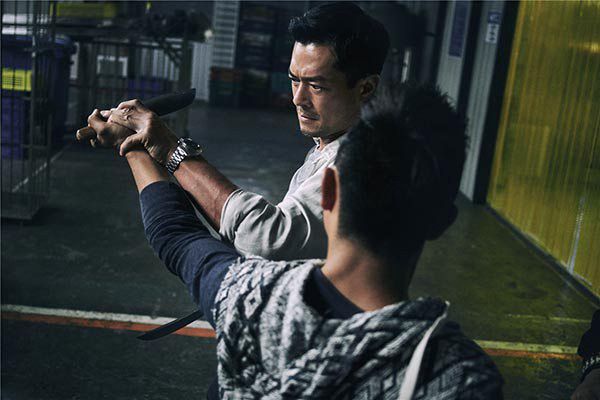SPL: Paradox (Wilson Yip, 2017)

It’s unclear if this film is actually a continuation of the SPL series or if it just started as one and then mutated into its own thing. I thought I saw the characters for “Sha Po Lang” on the title card of the movie though, so I’m just gonna go with it. Regardless, like the second film in the series, SPL 2: A Time for Consequences, Paradox has only a tenuous thematic relation to its forebears and all of the characters are new. Louis Koo plays a Hong Kong cop who travels to Pattaya, in Thailand, in search of his daughter, who has gone missing. He hooks up with a Thai cop (Wu Yue) as the two uncover an organ-trafficking ring with connections all the way to the top of city government. Helping out in the investigation is another cop, a superstitious (possibly psychic) Tony Jaa, star of the last SPL and arguably the best martial arts star in the world today, in what amounts to little more than a guest-starring role. The final villain is played by Lam Ka-tung (Sparrow, Trivisa), which means that the two most important Thai characters in the film are played by Chinese actors. Such are the vagaries of international cinema.
Louis Koo is an unlikely choice for the lead in a martial arts film, and make no mistake: this is the best kung fu film of the year. Sammo Hung choreographs the action, and it’s as brutal as the best of director Wilson Yip’s collaborations with Donnie Yen (the first SPL, the Ip Man series, Flash Point). The film’s signature sequence begins with close quarters fighting between Wu Yue and three villains, led by Chris Collins (a real-life Wing Chun master who is delightful as a hipster thug) in a small apartment, all knees and elbows and heads crashing into walls. It then extends to a rooftop chase with Tony Jaa chasing Collins, Sammo and Jaa’s creativity in manipulating objects as both weapons and obstacles meshing perfectly. It’s a hilarious, awe-inspiring sequence, ending in an act of gloriously melodramatic heroism. It’s the only real showcase Jaa gets in the film, and alone justifies the its existence. For the rest of the movie, the action prioritizes brutality over beauty, but Sammo somehow manages to make Louis Koo look like he can actually hold his own in a fight (watch how he directs Koo to not look at the punches he’s nonchalantly deflecting, as if this is all too easy for him), something I don’t think anyone has done this well in Koo’s 20 years as a movie star. The performance would earn Koo Best Actor prizes at both the Asian Film Awards and the Hong Kong Film Awards. With Sammo also winning for Action Choreography at the latter.
This turn towards darkness makes this easily the bleakest of an already bleak series, if only because there’s no scene to rival the Donnie/Sammo showdown in the first one or the Wu Jing/Tony Jaa/Zhang Jin fight at the climax of the second (which just might be the best fight of the decade). But what sequences there are are notably free of digital manipulation (with the exception of the blood, there’s so much blood) and their editing, though faster than a purist would like, is always clear and legible. This is the new paradigm in Hong Kong action direction: no longer the simple contrast between Chinese long takes and Hollywood fast-cutting. Everyone cuts quickly, but the ones who know what they’re doing can also cut coherently.
Paradox isn’t as grand or expansive, or as weird as the second film, Wilson Yip being more content with effectively hitting generic beats than the idiosyncratic Soi Cheang. But Koo’s single-minded performance channels the parental fury of the Taken-esque scenario nicely and this will hopefully be a breakthrough role for Wu Yue, a fine actor and martial artist who has spent most of his career in television. Lam Ka-tung is eerily reserved as the final villain, an even quieter performance than his work in Trivisa. In a national cinema as expressive and over-the-top as Hong Kong’s, it’s refreshing to find an actor this accomplished work so very hard at underplaying. In another era, he would have turned out to be the baddest fighter of them all, following the unassailable logic of Chinese films past that the more power you have in the material world, the better your kung fu. But this is the 21st century, and all violence against the system buys you is blood while the prevailing order maintains itself with barely a ruffle.
